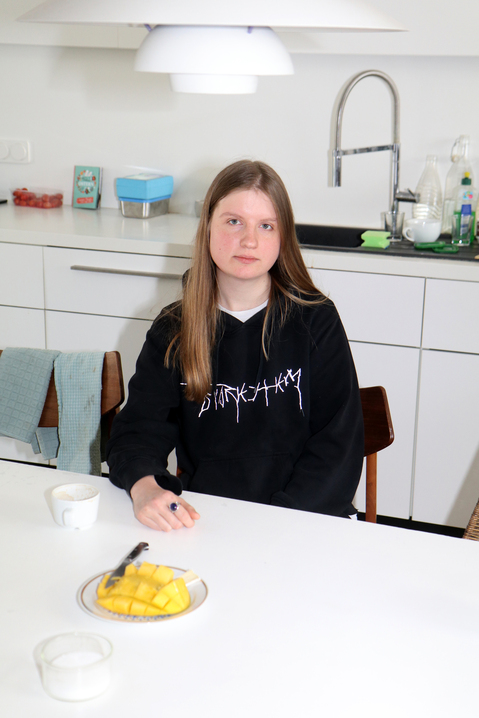Valeriia / Anton Shebetko, Ukraine
“I’ve liked girls all my life. I never openly talked about it with my relatives. In particular, my grandmother is very strict in this regard – she tried to force me to come out and said that she would not speak to me if she knew that I was dating a girl. She is sure that it is a disease. It seems to me that my relatives understand everything, but do not want to believe it.
I am originally from Lugansk. Now it is difficult to judge the situation with LGBTQ+ rights in the region, because there, as the Russian regime came, I noticed by the majority that people began to drink more, became angrier at life and the mentality of the people seemed to change.
I feel relatively safe in Kyiv – we are girls and a couple of times there were situations when unfamiliar guys tried to somehow joke or shout something at us. There was a situation in Kyiv when a girl with a rainbow flag was attacked; after that we realized that we had to be ready for anything and carried pepper spray with us.
Recently, I have noticed changes in Kyiv for the better. People are being educated, but the more people who come to know about the LGBTQ+ community, the more right-wing radicals appear who are against it. On the other hand, there are not so many of these people, it’s just that the LGBT community itself is growing and there are also more people who are normal about this. It seems to me that due to this, people’s attitudes are changing.
About war. The war and active actions began in Lugansk in May 2014. Russian mercenaries and pro-Russian separatists began to seize administrative buildings; at some point the first explosions sounded. We were still in Lugansk in May and mid-June, but when we realized that everything would only get worse, we decided to go to the sea with the whole family, where we waited a week or two because everyone had enough of the war.
Active actions continued in Lugansk for about three months. But in terms of the scale of destruction, this cannot be compared with the hell that the Russians unleashed in a few weeks in Gostomel, Borodyanka, Bucha, Mariupol, and all over Ukraine.
I was 16 years old then. I came with my father to Kyiv and slowly built my life there, realizing that lawlessness and hatred of the majority towards Ukraine still reigns in Lugansk, because they said so on TV. But my father decided that my family and I were returning back to Lugansk. For me, it was one of the toughest, toughest moments. I have never seen tanks, destroyed houses, burnt cars, in a word – war. The outskirts of the city suffered, mainly.
I had a feeling that this is not my city. There were many Russian soldiers, there was a lot of banditry. People who were nobody took up arms, put on uniforms and felt the power. Many people who were captured back in April 2014 by the SBU were tortured in the basements. A couple of my friends spent about a month there; they were beaten, tortured – one guy had long hair and was shaved bald. There was one bucket where everyone went to the toilet, they were constantly woken up and not allowed to sleep. I heard from my friends that people who sincerely loved Ukraine had the Ukrainian coat of arms carved on their backs.
I understood that Russian propaganda was a lie, that most people were simply brainwashed, including my dad. I could not stay there and moved to Kyiv. My family is divided; my father is pro-Russian, and my mother loves and believes in Ukraine. Instead of the news, he looks at how it used to be and how it has become: how they lived before 2014, and how they live now.
On February 24th, my girlfriend Lisa and I were in Athens, the return flight was scheduled for February 25th. Until the last moment, we did not believe in a full-scale offensive. We thought that Putin was an old and stupid man, but still he is unlikely to go for it. On the morning of the 24th, relatives and friends began to write and call me and say that the war had begun. Lisa and I were frightened because we didn’t know what to do.
When the war started, we sat for the first day and read all the news. It was completely incomprehensible how everything would develop. Since it was already in the evening, we decided to go out to the city to eat with Liza. At some point, a guy rushed past us on the street. He started shouting: ‘Russia!’ and for some reason looked straight into my eyes. I had the feeling that he did not just scream; it was as if he had attacked me.
There are quite a lot of Russians in Athens. A few days later another incident happened. We were walking from a demonstration for Ukraine, we were wearing Ukrainian symbols in the colors of the flag. One of the local policemen began to smirk and sing the Russian national anthem as he looked at us. We didn’t feel safe there, so we decided to move to Berlin. I want the war to end as soon as possible so we can return to Kyiv. Before the war, I considered moving, but I realized that it was too early to leave; there were things to do in Kyiv and things to live for.”




